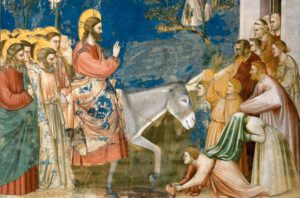Right from the eleventh Sunday of Ordinary Time, we have been looking at the messianic role of Israel, on the one hand, and, on the other, looking at how Jesus was preparing His disciples for the apostolic mission. And today, the fourteenth Sunday, Zechariah famously announces the coming of the Saviour at an unspecified time in the future and, in the Gospel, Jesus spells out the nature of His Kingdom.
Zechariah is a common name in the Bible. The figure we encounter in the First Reading (Zech 9: 9-10) is one of the twelve minor prophets of Judah (and not to be confused with the New Testament Zechariah who was the father of John the Baptist). Zechariah was born in Babylon where his ancestors had settled after the Babylonian capture of Israel in 597 BC. Some seventy years later, when Babylon in turn was captured by the Persians – whose policy it was to repatriate foreigners and have them worship their own gods – Zechariah and fellow Jews returned to Israel.
The Jews now devised plans to rebuild Jerusalem and the Temple, and to constitute a nation. They were conscious of their status as God’s Chosen People, destined to attract the nations to worship the true God in Jerusalem. This led Zechariah to write in a messianic vein, as is evident from the second part (chapters 9-14) of his book. Hopes of restoring the kingdom of David remained unfulfilled in his time, but half a millennium later, Jesus, the true Son of David, fulfilled those expectations by preaching the Kingdom to the Gentiles, so that every knee may bow and every tongue confess that Jesus Christ is Lord.
The prophecies of Zechariah came true in Jesus’ life. Note how the donkey was Jesus’ choice as He entered Jerusalem. The donkey is looked down upon today but was a noble beast back in the day; it was used by royalty on missions of peace whereas the horse was a herald of war. The significance of Jesus’ choice was surely not lost on the Jews; but while the crowds cheered Him, Jesus silently weeping for His beloved Jerusalem, anticipated that the cheers would soon turn into jeers.

In the Gospel (Mt 11: 25-30), Jesus states that the Kingdom will be more easily reached by the little ones than by the worldly wise, and by the poor rather than by the rich. The children and the poor are more attuned to the spirit of truth and love, which is God’s; the learned elders and the affluent, on the other hand, depend overly on themselves and tend to forget God, until the going gets tough and they can’t get going! Jesus graciously invites all and sundry to come to Him and be at peace; His yoke is liberating, whereas the spirit of the world is jealous and boastful, arrogant and rude; it insists on its own way, is irritable, resentful, and rejoices at wrong (cf. 1 Cor. 12: 4-8).
Our Lord’s teachings are not for individuals alone; it is for societies and countries too. It has the power to raise a civilisation, as it once did, especially in the West. Christianity has inspired art and culture, politics and philosophy; it has influenced ethical and aesthetic standards across human activity, including architecture, education, medical care, music, science. It is quite another matter that the same spirit is now conspicuous by its absence, for many societies and countries have unfaithfully and ungratefully relinquished their gold medals and settled for bronze.
St Paul in the Second Reading (Rom 8: 9, 11-13) teaches us how to live by the Spirit, making it a way of life. As we reflected last Sunday, we ought to live in the supernatural sphere rather than in the natural plane, for as the Apostle of the Gentiles reminds us: ‘You are not in the flesh, you are in the Spirit, if the Spirit of God really dwells in you.’ Just as family members worth their salt partake of the family ethos and thus have a sense of belonging, only those who have Christ’s Spirit belong to Him. Christ’s Spirit is life-giving; the flesh is deadening.
That’s the agenda every Christian should go by, live by, and then, as the Psalmist sings, we will have a multitude of reasons to bless God’s name, give Him glory and praise for evermore for our life of hope and joy.
Banner: https://pixabay.com/photos/jesus-christ-religion-jesus-898330/
i found these Reflections of Sunday July 9, most lucid and comforting. My overall feeling, as I read the Scriptures, is that reflections like this, on Jesus’ Life and on passages of the Bible, particularly the New Testament, are conducive to inspire a closer relation with the Divine. What at times I find unhelpful are the subsequent underpinnings that have been added by the theologians, well intentioned without doubt, that have the unintended effect of adding a tinge, nay, a whole lot, of dissonance in the otherwise supernatural fabric of the Gospels. For example, only yesterday I came across what is known as “Limbus Patrum” (Fathers’ Limbo) where Old Testament Saints (including even Abraham, Noah, Moses, along with the rest of righteous) were thought to have been confined until they were liberated by Christ in his “descent into hell”. I confess, with all respect, THAT was pretty difficult to inhale, to put it mildly.
Thank you Oscar. This reading was most inspiring.
The solution is to give exponentially more time and effort to the interior life than the exterior life.